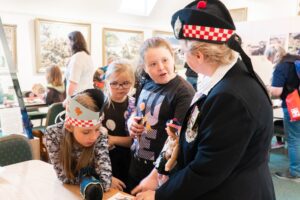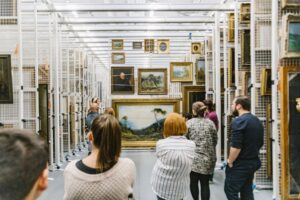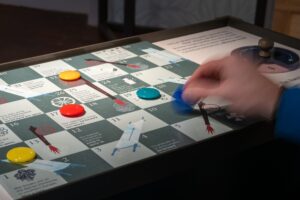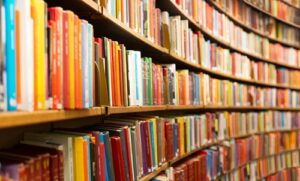What is museum learning?
In response to the 2024 International Museum Day theme of ‘Museums for Education and Research’, Loretta Mordi, MGS Learning and Engagement Manager reflects on the current topics museum learning spaces are supporting and gives top tips for creating learning environments within museums.

What is museum learning?
Museums and galleries provide safe and dynamic learning environments with rich resources to inspire creativity, education, and enjoyment for all.
Learning is:
“a process of active engagement with experience. It is what people do to make sense of the world. It may involve an increase in skills, knowledge or understanding, a deepening of values or capacity to reflect and appreciate. Effective learning leads to change, development, and a desire to learn more”
The Campaign for Learning, 2000
Learning is core to what museums do and audiences are at the heart of their education and learning activities.
It never ceases to amaze me how museum education and learning professionals are quick to respond to challenges and concerns in the operating context, which they often see as opportunities as opposed to hinderance. They continue to use imaginative and innovative approaches to develop inclusive and transformative programmes that deliver quality learning experiences.
Benefits of museum learning
- A quality and safe learning environment that is inclusive and puts the learner at the centre.
- Helps learners to develop a sense of identity, understanding of the world around them, and sense of pride in their heritage.
- Deepens knowledge and understanding and broadens experiences for people of all ages enabling them to develop confidence, motivation, and skills for future careers.
- Improves the communication and problem-solving skills of young people.
Approaches to museum learning
- Self-directed learning
- Object-based learning
- Loan box/ handling box
- Workshops and exhibition
- Outreach
Key themes in museum learning
Museum learning practitioners are partnering with their school communities to play a vital role in debates and conversations around anti-racism, empire and colonialism, decolonisation, inclusion, accessibility, the sustainability agenda, children’s rights, human rights, health, and well-being.
By developing programmes and workshops around these societal issues museums can contribute to the learning for young people. They are helping to promote identity, equity, inclusion, and respect for individual and cultural diversity which leads to tolerance and positive changes in individuals and society.
These key themes were at the forefront of a recent Blether Together session, in partnership with Education Scotland, on the theme of decolonising the curriculum. During the session Museums Heritage Highland spoke about their approach to decolonising the curriculum with “Our Big Question on apologising for the Empire”.
The team use their collections to develop digital learning resources and educational programmes to contribute to debates around historic and systemic racism, empire and colonialism, and decolonisation. Glasgow Museums spoke about their quarterly CPD sessions for teachers which include topics such as history of the Trans-Atlantic Slave Trade.
Museum learning contributes to Climate Change and the Sustainable Development goals (SDG 4 and 9) by engaging young people and schools in learning about climate change. Museums are developing programmes, events, and training that supports young people to act on climate change using museum collections and spaces.
Technology continues to present opportunity for learning professionals to provide immersive and transformative learning experiences and widen reach and engagement. Digitisation and virtual learning in the form of e-learning can enhance learning resources and enable wider accessibility for audiences who face geographical disadvantages and some disabled people.
Conversations on the use of Artificial Intelligence (AI) are gathering momentum. Museum learning has a role to play in the use of artificial intelligence. While little is still known about AI, I would encourage involvement of museums in these conversations to avoid leaving them behind. I’m also mindful that we as “educators should not let AI deprive learners of real human intelligence” (Pak Tee Ng, 2023).

Top tips for museum learning
Creating successful learning programmes and resources with your audiences
- Access is crucial to widening participation. Make your learning programme accessible to all audiences regardless of their background. Taking cognisance of their individual and complex needs to ensure that they have a variety of ways to engage with learning.
- Access in museums incorporates inclusion and diversity, involves using creative ideas to tackle physical, intellectual, and social barriers that prevents people from taking advantage of the learning opportunities on offer, and ensures equal access for all.
Partnership and collaboration with schools
- Build relationships with teachers and other learning practitioners to support the delivery of Curriculum for Excellence and its experiences and outcomes for learning. This can help develop learning opportunities for enquiry-based engagement that inspires and stimulates creativity and enjoyment.
- Use digital technology to develop and create learning programmes by collaborating with schools and learning providers to widen access and enhance learning and engagement.
- Use your collections to contribute to conversations on big issues. Include topics on decolonisation, equity, diversity and inclusion, STEM/STEAM, attainment, literacy, social studies, Early Years, Children’s Rights, and climate change to help schools to support pupils to become effective global citizens.
- Partnership can help share resources including know-how, facilities, and spaces for learning.
Review and evaluate your programmes.
- Review and evaluate your learning programmes and activities to demonstrate impact, share best practice, and for continuous improvement.
Development for learning practitioners
Develop your own continuous learning development by attending events and seeking networking opportunities, including MGS Knowledge Exchange sessions, Blether Together with teachers, forums, workshops, and conferences. These provide opportunities to tap into expertise and generate knowledge outside your organisation. Follow us on Eventbrite to be notified of any upcoming sessions.

